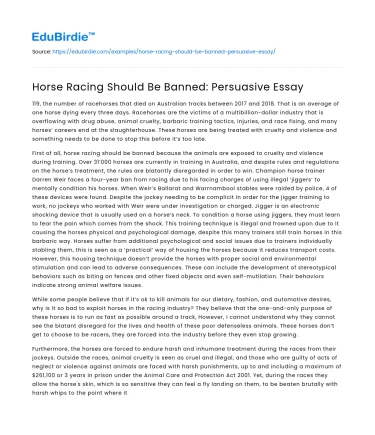119, the number of racehorses that died on Australian tracks between 2017 and 2018. That is an average of one horse dying every three days. Racehorses are the victims of a multibillion-dollar industry that is overflowing with drug abuse, animal cruelty, barbaric training tactics, injuries, and race fixing, and many horses’ careers end at the slaughterhouse. These horses are being treated with cruelty and violence and something needs to be done to stop this before it’s too late.
First of all, horse racing should be banned because the animals are exposed to cruelty and violence during training. Over 31’000 horses are currently in training in Australia, and despite rules and regulations on the horse’s treatment, the rules are blatantly disregarded in order to win. Champion horse trainer Darren Weir faces a four-year ban from racing due to his facing charges of using illegal ‘jiggers’ to mentally condition his horses. When Weir’s Ballarat and Warrnambool stables were raided by police, 4 of these devices were found. Despite the jockey needing to be complicit in order for the jigger training to work, no jockeys who worked with Weir were under investigation or charged. Jigger is an electronic shocking device that is usually used on a horse’s neck. To condition a horse using jiggers, they must learn to fear the pain which comes from the shock. This training technique is illegal and frowned upon due to it causing the horses physical and psychological damage, despite this many trainers still train horses in this barbaric way. Horses suffer from additional psychological and social issues due to trainers individually stabling them, this is seen as a ‘practical’ way of housing the horses because it reduces transport costs. However, this housing technique doesn’t provide the horses with proper social and environmental stimulation and can lead to adverse consequences. These can include the development of stereotypical behaviors such as biting on fences and other fixed objects and even self-mutilation. Their behaviors indicate strong animal welfare issues.
Save your time!
We can take care of your essay
- Proper editing and formatting
- Free revision, title page, and bibliography
- Flexible prices and money-back guarantee
While some people believe that if it’s ok to kill animals for our dietary, fashion, and automotive desires, why is it so bad to exploit horses in the racing industry? They believe that the one-and-only purpose of these horses is to run as fast as possible around a track, However, I cannot understand why they cannot see the blatant disregard for the lives and health of these poor defenseless animals. These horses don’t get to choose to be racers, they are forced into the industry before they even stop growing.
Furthermore, the horses are forced to endure harsh and inhumane treatment during the races from their jockeys. Outside the races, animal cruelty is seen as cruel and illegal, and those who are guilty of acts of neglect or violence against animals are faced with harsh punishments, up to and including a maximum of $261,100 or 3 years in prison under the Animal Care and Protection Act 2001. Yet, during the races they allow the horse's skin, which is so sensitive they can feel a fly landing on them, to be beaten brutally with harsh whips to the point where it can tear the skin and cause cuts. All in order to get the horse to run at neck-breaking speeds down the track. There is a limit on the number of times jockeys can use the whip throughout the race, however, in the last hundred meters, the jockeys have free rein on how many times they want to use the whips. These horses are been flogged into an early grave, yet race organizers refuse to do anything. The RSPCA has been working on trying to ban the use of whips through protests and petitions. Independent research commissioned by the RSPCA confirms around 3 in every 4 Australians (74%) think horses should NOT be hit with a whip. Animal advocates also criticize the use of whips, saying a study in 2011 indicated whipping makes no difference in a horse’s performance. Despite this, their attempts have been unsuccessful so far.
Furthermore, horse racing should be banned due to the health risks for the horses. Horses often begin training before they have reached the age of two. This is too young. Their bones are still growing and their bodies are still developing. Their bodies are not ready to handle the pressure of running full speed down a track with a jockey on their back whipping them, so they will go faster. Young horses are more susceptible to injuries than older horses. Strained tendons or hairline fractures are common occurrences in racehorses. Instead of letting the horse rest and recover from any injuries they may have obtained from a previous race or training, their vet or trainer often gives them drugs to dull the pain of the injury so they can race, but the injury itself is not fixed. The injuries often get even worse until the animals are unable to walk at all.
A ban on racing should be put into place because racehorses are being led into an early grave. Once the horses cannot race anymore or they stop winning their races, they are not free to roam the fresh green paddocks to live out the rest of their lives peacefully. They are often shipped off to foreign countries such as Mexico or Japan to be slaughtered for meat to be turned into dog food or glue. These horses can still often be at a young age and are killed at just 5 or 6 years old, despite them having a life expectancy of approximately 30 years. Additionally, many horses die immediately after races due to massive bleeds and cardiac failure caused by the extreme strain racing put on the horse’s bodies.






 Stuck on your essay?
Stuck on your essay?

